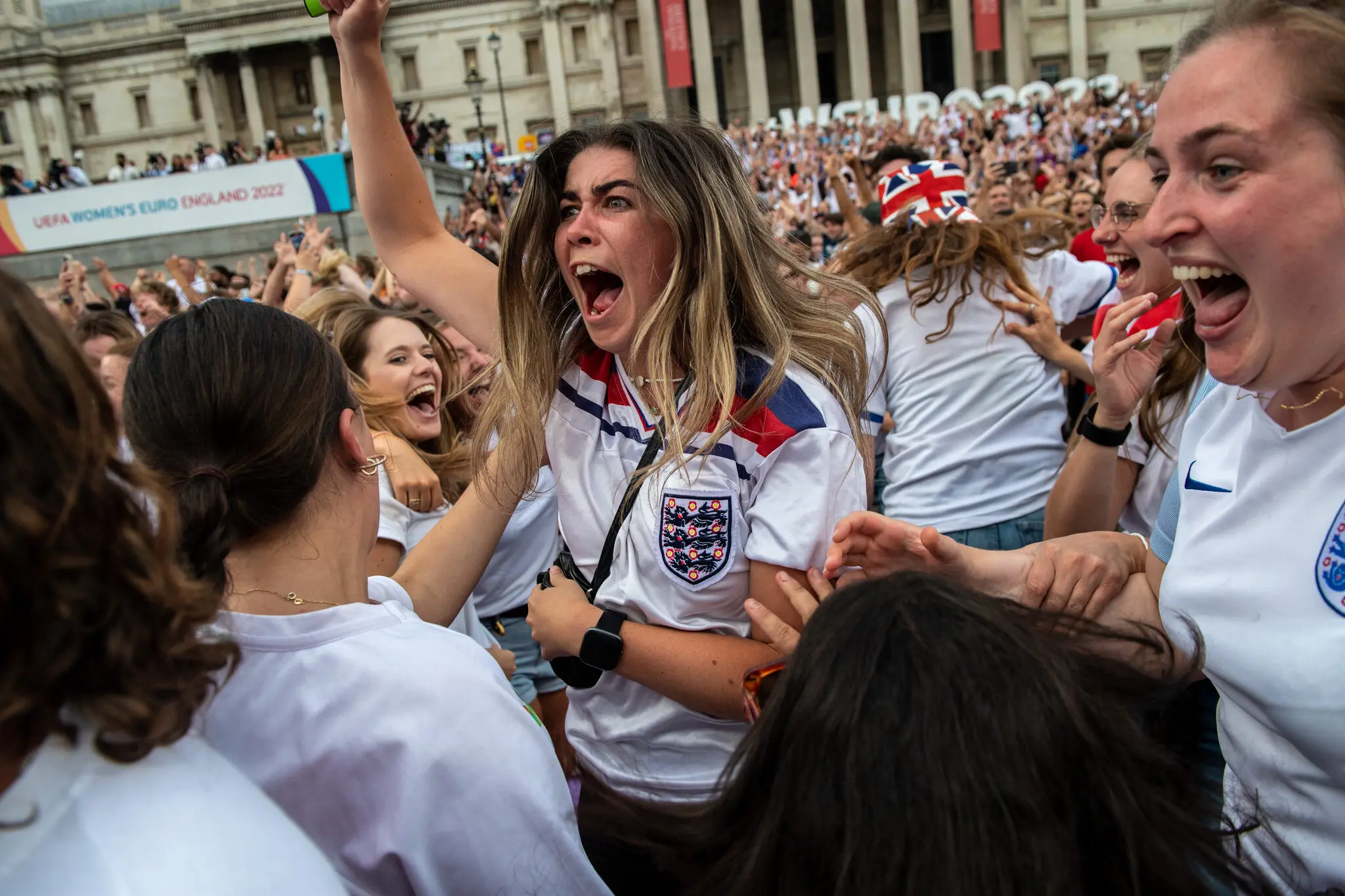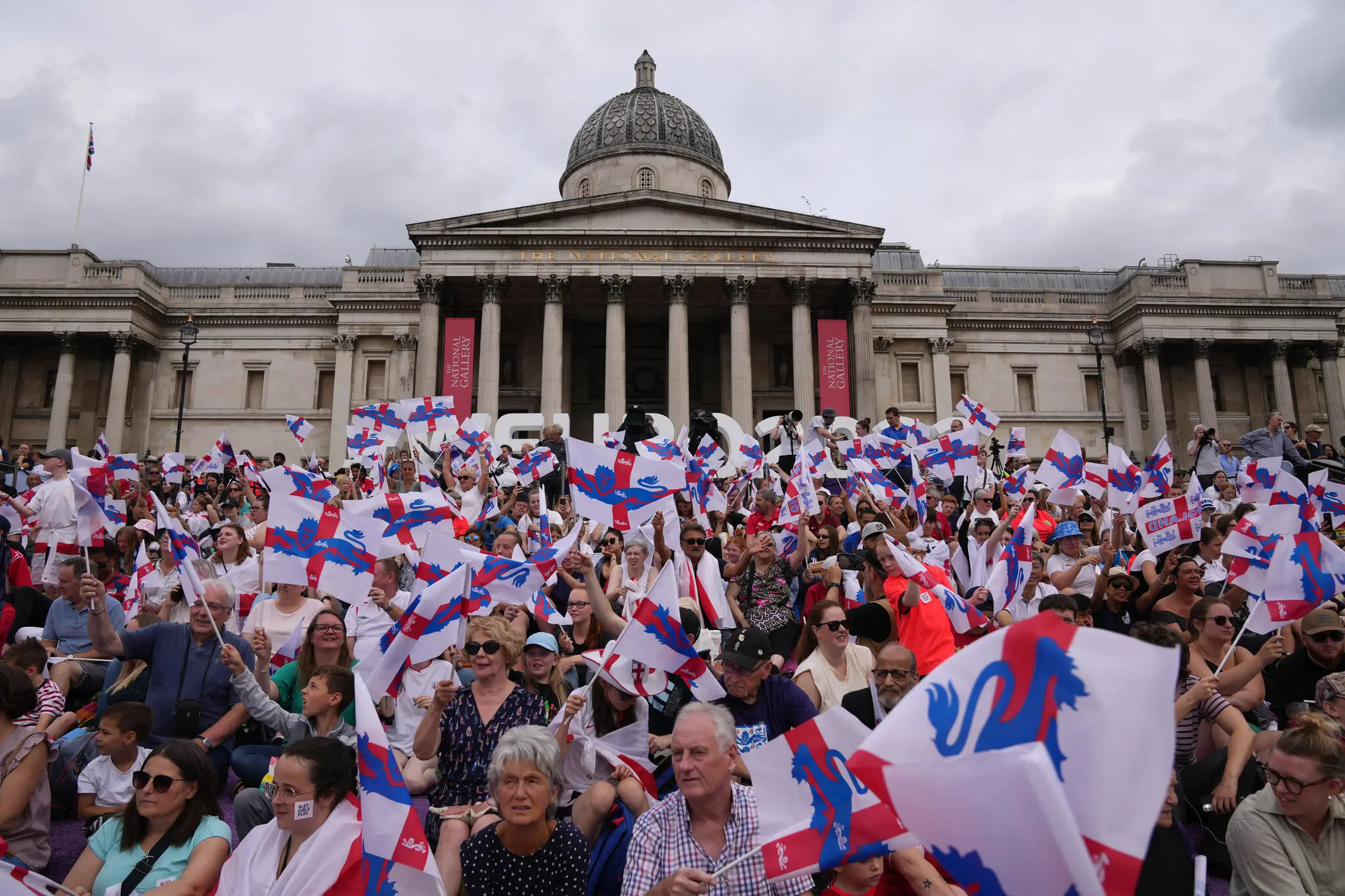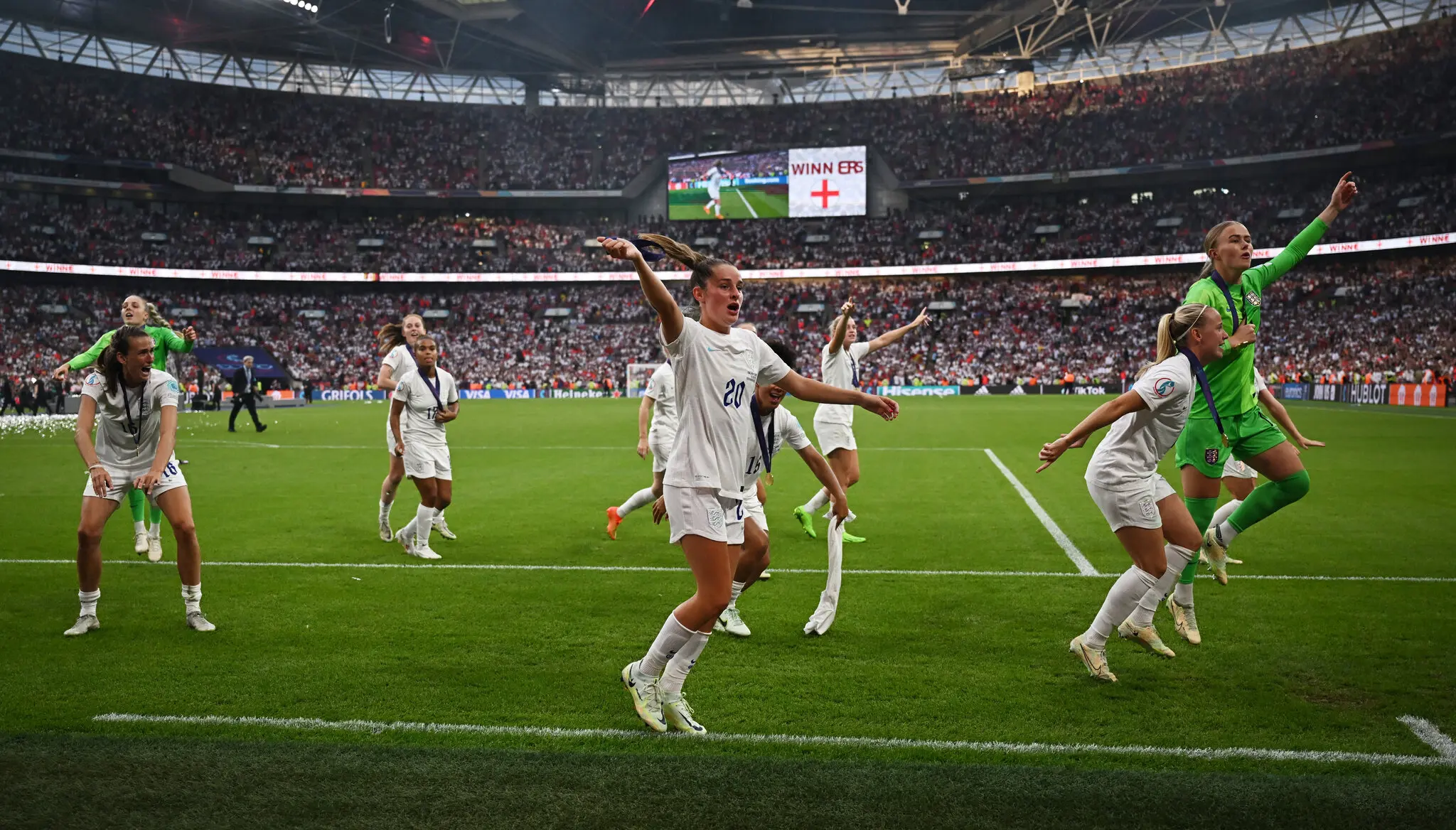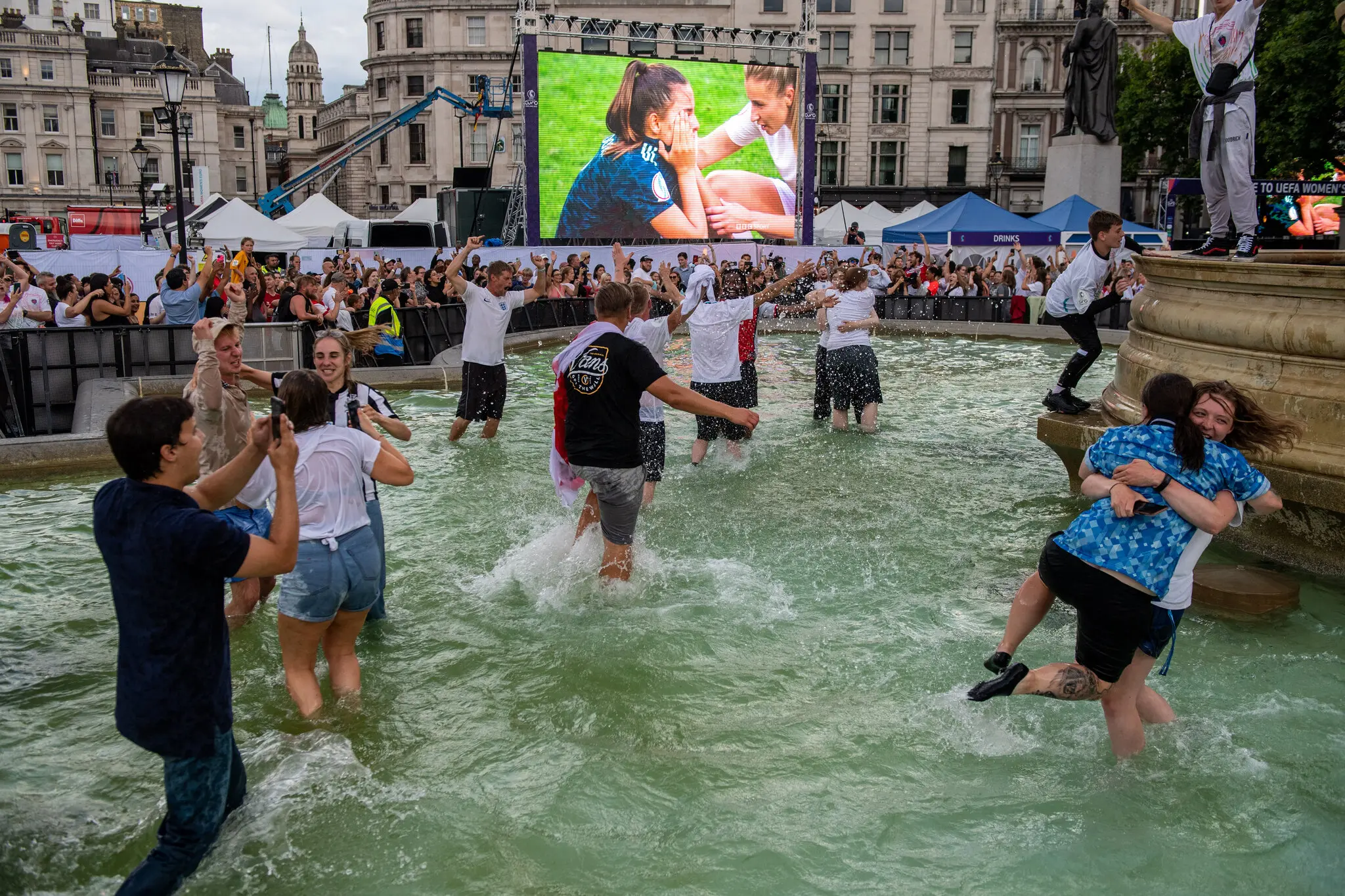
LONDON — For over 50 years, English soccer fans have hoped, prayed and sung that a major trophy would “come home.” Now it finally has. And they can hardly contain themselves.
On Monday, pictures of the Lionesses, as the team is known, dominated the front pages of British newspapers after their 2-1 win over Germany at Wembley Stadium in London, the headlines lauding the new European champions as “game changers” or “history makers” and declaring “No more years of hurt.”
Trafalgar Square, the site of a huge viewing party a day before, was the scene for more jubilation, as thousands turned out for a trophy-lifting ceremony with the team.
Many fans arrived in team jerseys, carried England flags and sang “Three Lions” — the song whose “football’s coming home” chorus had come to express English fans’ yearning for a trophy — by heart as the team took to the stage.
“We said we wanted to make our legacy about winning and that’s what we did,” said the team’s captain, Leah Williamson, taking in the crowd’s thunderous applause.
“We’ve changed the game in this country and hopefully across Europe across the world,” she said.

Fans gathered for a trophy lifting ceremony at Trafalgar Square, on Monday. Maja Smiejkowska/Reuters
The crowd included families and scores of young girls wearing stickers with the hashtag #LetGirlsPlay, trumpeting aspirations for their future in a sport that for decades forbade their participation, and still fails to offer equal opportunities despite recent improvements.
“It is just so exciting for a young woman who grew up playing football seeing them fly so high,” said Savannah Xanthe. 18, who came to the ceremony wrapped in an English flag with her two sisters.
“Women don’t get a chance to be taken seriously in soccer,” said Amy Symonds, 33, who plays soccer in Bristol. She said she was shaking with excitement while watching the match yesterday. “This shows what we can do and it must be taken seriously.”
She added that she hoped the victory would bring to the sport the attention that it deserved.
“This is a beginning, not an ending,” she said.
Politicians and royals sent messages and congratulations to the team on its victory — a dramatic conclusion that had parallels to England’s last major championship, in 1966, when the country hosted the men’s World Cup and its team defeated Germany in the final.

England’s women’s football team celebrated after winning the women’s European Championship at Wembley, on Sunday. Dylan Martinez/Reuters
But the success held the potential to go beyond national pride and euphoria, with women’s soccer occupying the public consciousness in Britain like never before.
More than 600,000 tickets were sold for the European Championship, more than double the total for any previous edition of the women’s tournament, and the final was the most-watched television program in Britain this year, according to the BBC. The broadcaster said the match was seen by a peak audience of 17.4 million, close to a third of England’s population, and added that there were an additional 5.9 million streams online.
“I think we really made a change,” said the team’s Dutch coach, Sarina Wiegman, at a news conference after the match on Sunday. The team had done a lot for the sport but for the role of women in society, too, she added, a sentiment that was echoed by others.
“It’s been an amazing month and an amazing day yesterday,” said Mark Bullingham, the chief executive of the Football Association, England’s governing body for soccer.
“I think it will really turbocharge everything we have been doing in the women’s game,” he said in an interview on “BBC Breakfast” on Monday, adding that the organization had invested heavily in women’s soccer over the past few years.
“There is no reason we shouldn’t have the same number of girls playing as boys and we think it will create a whole new generation of heroes who girls aspire to be like,” he said.
The recent shift, while significant, is overdue for a sport that has long tradition of discriminating against women. Top English clubs like Manchester United, Manchester City and Chelsea have poured millions of dollars into their women’s programs in recent years, part of a broader trend of investment across Europe that has seen the continent close the gap with the United States, the longtime global leader in women’s soccer. That kind of broad structural support is seen as vital to giving women a system in which to thrive.
But as things have evolved over the past decade, experts say there is still plenty of room for improvement.
“This is at a time when public attitudes toward sexism and misogyny are changing, and football needs to change too,” said Stacey Pope, who heads “Fair Game,” a collective of 34 English soccer clubs that published a report in March that found evidence of a gaping gender divide in soccer clubs throughout England and Wales was keeping the sport “in the Dark Ages.”

Fans celebrating in Trafalgar Square at the end of Sunday’s game. Chris J Ratcliffe/Getty Images
Only 11.1 percent of board members at Premier League clubs are women, and two-thirds of the league’s teams have all-male boards, the report said. Significantly fewer women were attending games in England compared with other countries.
But a newfound optimism took hold this weekend as the Lionesses emerged victorious on Sunday from a match that was attended by a record number of fans — the crowd of more than 87,000 was the biggest for any European Championship final, men or women.
Queen Elizabeth sent a message of congratulations to the team, writing that while the athletes’ performances deserved praise, “your success goes far beyond the trophy you have so deservedly earned.”
“You have all set an example that will be an inspiration for girls and women today, and for future generations,” she wrote.
Kevin Windsor, a graphic designer in London, watched the match with his 3-year-old daughter, who was wearing a princess gown. “My daughter doesn’t have to have an interest in football. She just has to know that it’s an option,” he wrote on Twitter. “That she can become anything she sets her little heart on. From a princess to a lioness. And everything in between.”
FEATURED IMAGE: England football fans celebrating in Trafalgar Square on Sunday after the game-winning goal in the women’s European Championship final. Chris J Ratcliffe/Getty Images
By Emma Bubola and Cora Engelbrecht/The New York Times




